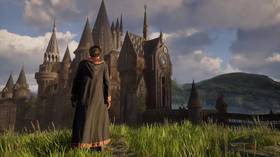Pro-trans activism fails to dispel the magic of Hogwarts Legacy


This month, a video game about high school wizards found itself at the center of the culture war.
The release of Hogwarts Legacy, the open-world RPG set in the Harry Potter universe, became a subject of controversy due to a widespread effort by trans activists and woke journalists to cancel the franchise’s creator, J.K. Rowling.
The game’s release has sparked intense debate over whether it’s possible to distance the game from Rowling’s “trans-exclusionary” views, with activists calling for a boycott because the author stands to benefit from the game’s success.
In the summer of 2020, Rowling published a lengthy essay on her personal website, expressing her skepticism of transgender-inclusive laws and policies. She invoked her own experiences of domestic abuse and sexual assault to argue against gender self-identification laws and raised concerns about male sexual predators entering women's restrooms – concerns that trans advocates claim to be a “myth.”
This sparked widespread condemnation from LGBTQ+ advocacy organizations, who accused Rowling of promoting harmful views. Organizations like the Human Rights Campaign have even gone so far as to attack the author in defense of serial rapists over her remarks on the matter. Won’t someone please consider the feelings of rapists?
Rowling's views have also been purportedly reflected in her novel, Troubled Blood, which tells the story of a serial killer who dresses as a woman when committing murders. Critics have accused Rowling of promoting transphobia and discrimination against transgender individuals – never mind the fact that numerous serial killers throughout history including Hadden Clark, the “Cross Dressing Cannibal”, Dennis Rader, the “BTK Killer”, and others have done exactly that.
Rowling herself explained that the serial killer in her novel is loosely based on these killers – and in her defense, the killer’s transvestism barely features, but I digress.
Despite the backlash, Rowling has refused to back down from her views. The author convened a public "gender wars" meet-up with like-minded women, and her words were cited when US Senate Republicans blocked the passage of a pro-LGBTQ bill in 2022.
Although Rowling’s views on the subject continue to be confirmed time and again by reality, the furor against the author has only mounted with the release of the video game. The controversy has spilled over into the world of Hogwarts Legacy, with some fans questioning whether the game reflects Rowling's views.
Trans advocates have gone out of their way to “cancel” the game. Just months after it was announced, activists, backed up by allies in the media, unearthed YouTube interviews staged by the game’s former lead designer, Troy Leavitt, whom they claimed participated in GamerGate and shared anti-social justice views. He left the company in the wake of the controversy.
While the development of Hogwarts Legacy began before Rowling's anti-transgender statements came to light, the controversy has not gone unnoticed by the developers, Avalanche Software and Warner Bros Games. They have attempted to distance the game from Rowling's views, and some reportedly expressed frustration at having to deal with the aftermath and activists’ anger.
Though the character creation options in the game will allow players to customize their avatar's voice, clothing, and body shape, regardless of gender presentation, critics still contend that the Harry Potter canon is patriarchal and regressive compared to the views and expectations of woke progressives – all because the game is set in the 1800s. Much like their arguments against Rowling, they’ve not been very persuasive.
The release of Hogwarts Legacy raises an important question for fans: is it possible to separate the art from the artist? While some may argue that the game should be judged on its own merits, regardless of Rowling's views, others feel that participating in the game would be a tacit endorsement of her views.
While it is true that a portion of the game’s $60 price tag will make little difference to someone like Rowling, activists argue that tanking the game’s sales would show the symbolic power of consumer choice. By choosing not to support Hogwarts Legacy, these consumers can make a statement that they do not condone or support her.
However given Hogwarts Legacy’s chart-topping sales figures since its release, Rowling’s views on transgenderism are clearly of little import to most Harry Potter fans and many have even gone out of their way to buy the game in response to the woke backlash. Boycotts be damned – if the game is good, people will play it.
Regardless of where one stands on the controversy, it's clear that the release of Hogwarts Legacy is a fraught moment for the Harry Potter franchise. For some fans, the magic has been tarnished by Rowling's based views, but for many others, Hogwarts Legacy has been a success despite (or perhaps even because of) the controversy and is enchanting players in the same way that the original Harry Potter books did. Expect a sequel.
The statements, views and opinions expressed in this column are solely those of the author and do not necessarily represent those of RT.